as humans came to rely more on cultural adaptations what were the effects on our biology
How human culture influences our genetics
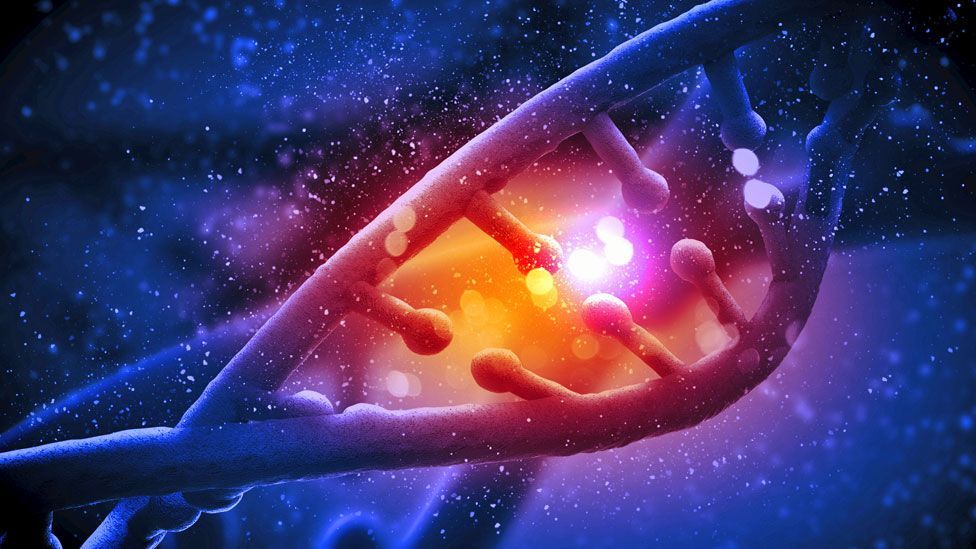
The way we eat, cook, explore and interact with others can influence our genes, says Jason Grand Goldman. And so how will modern culture shape our children?
Y
Yous shouldn't be able to drinkable milk. Your ancestors couldn't. It is only in the last nine,000 years that human being adults take gained that ability without condign ill. Children could manage it, but it was simply when we turned to dairy farming that adults acquired the ability to properly digest milk.
It turns out that cultures with a history of dairy farming and milk drinking have a much higher frequency of lactose tolerance – and its associated gene – than those who don't.
Drinking milk is but one of example of the mode that traditions and cultural practices tin can influence the path of our evolution. Civilization and genetics are traditionally idea of every bit two carve up processes, but researchers are increasingly realising that they are intimately continued, each influencing the natural progression of the other. Scientists call it "gene-culture co-development." Why does it affair? If we tin pin downwardly how culture influences our genetic makeup – and how the same processes apply to other creatures also – so we can be ameliorate understand how the way we act every bit a club today could influence our future.
Another example of how civilization influences our genes is the human relationship between yam farming and malaria resistance. Throughout much of Africa, people are in constant battle with malaria. Co-ordinate to the CDC, in 2010 at that place were some 219 meg cases of malaria reported worldwide, and 660,000 were fatal. More than xc% of those who died lived in Africa.
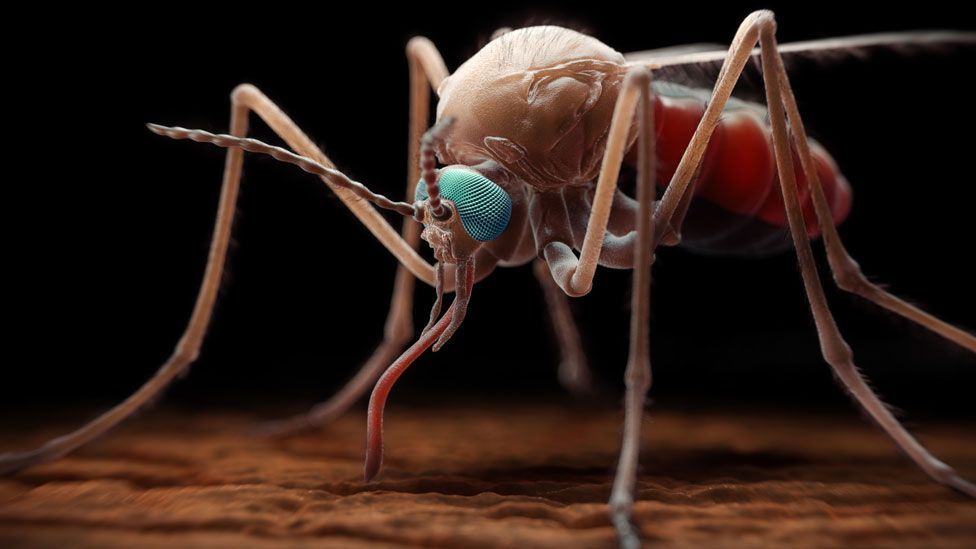
Malaria-carrying mosquitoes are a killer in Africa - but some people have a unlike affliction that gives them protection (SPL)
But there are some people who seem to have a natural defence force strength. Their ruby-red blood cells, normally shaped similar flattened disks, are shaped instead like a crescent or sickle. Because of the odd shaped blood cells, sickle-jail cell disease can atomic number 82 to blockages in claret vessels, which in turn cause hurting and organ damage. Under normal circumstances, development keeps sickle-cell disease to a minimum because information technology can exist then harmful and can reduce life expectancy. Only considering of a biological quirk, the sickle-cell gene can actually protect against malaria. So in parts of the world where malaria infection rates are extremely high, like Africa, natural choice may actually favour the sickle-shaped cells. In the chance of life, protection against malaria may exist preferable, even at the potential cost of suffering from sickle-cell disease.
Here'southward what's interesting: those communities that farm yams have much higher rates of the sickle-cell gene than nearby communities with different agricultural practices. In order to cultivate yams, trees had to be chopped downwards. "The removal of trees had the effect of inadvertently increasing the amount of standing water when it rained, which provided better breeding grounds for malaria-carrying mosquitoes," writes biologist Kevin Laland of the Academy of St Andrews in Nature Reviews Genetics. More than mosquitos mean more malaria, creating the atmospheric condition for sickle-shaped cells to get adaptive.
Then while it'southward sickle-prison cell disease that's protective against malaria, it was a uniquely human behavior – yam farming – that allowed evolution to act.
Non all examples of gene-civilisation co-development are quite equally beneficial. Polynesians, for example, take a uniquely high prevalence of type Two diabetes. It'southward among the highest worldwide, and is higher even than amid neighbouring human being populations. One group of researchers has discovered that the Polynesians have a particularly high frequency of a variant of a gene called PPARGC1A, and that may be responsible for their high frequency of blazon Two diabetes, at to the lowest degree in part.
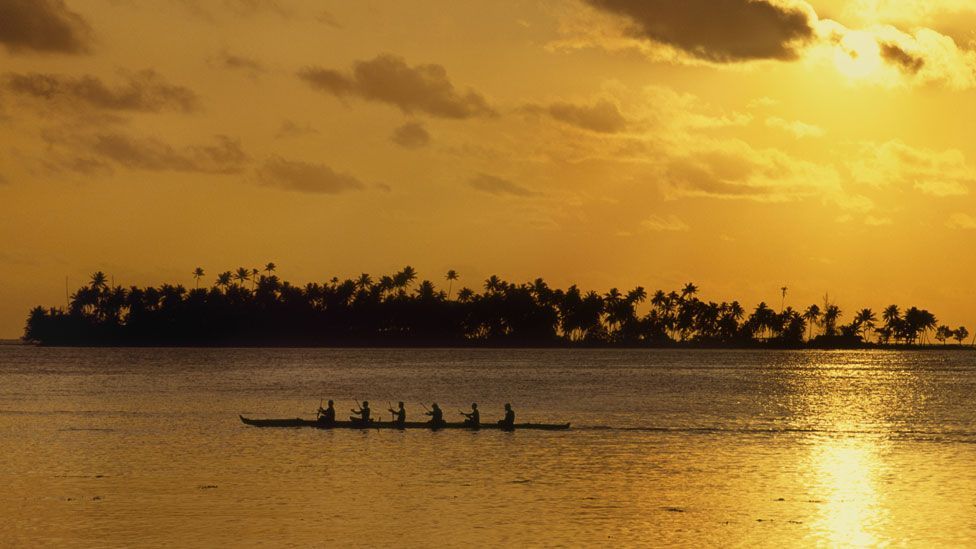
Did a historical culture of exploration brand Polynesian people more prone to obesity today? (SPL)
Why are they so uniquely afflicted past this disease? The researchers think information technology may take something to do with their ancestors' civilization of exploration. As the Polynesians settled the islands of the Pacific, they endured long voyages across the open up bounding main, and faced the stresses of cold and starvation. Those conditions may have encouraged "thrifty metabolism", which allows people to build upwardly fat deposits more than speedily when food is available. Natural pick may accept increased the frequency of associated gene variants amidst them. However the sort of metabolism that would have been useful to explorers can atomic number 82 to obesity and type II diabetes for individuals in modern cultures with consistent sources of nourishment. And so modernistic Polynesians may have inherited a susceptibility to type Two diabetes non because they lead a sedentary lifestyle, but because their ancestors decided to climb into some canoes and explore their planet.
While these examples are perhaps the best understood examples of gene-culture co-evolution, researchers accept identified scores of others. Our domestication of plants may take given a leg upward to the genes that permit us to detoxify sure chemical compounds found in the plants we consume. Our history of exploring new territories and unfamiliar climates may take acted upon genes that allow us to tolerate more extreme heat or cold than our ancestors. The invention of cooking may have altered the evolution of our jaw muscles and our molar enamel. The emergence of language and complex social cognition may have prompted natural selection to further guide the evolution of our brains and nervous systems.
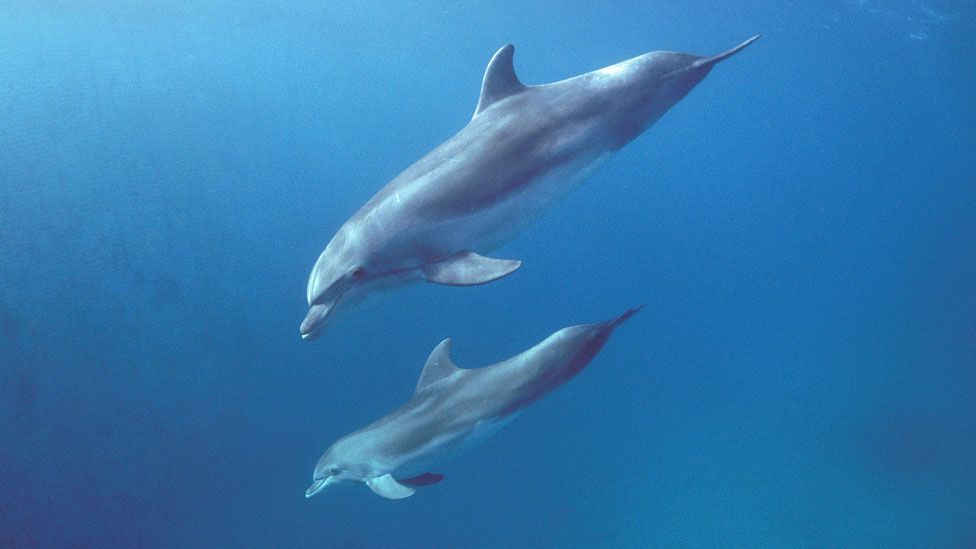
Dolphin mothers teach their immature a specialised 'civilisation' of feeding, called sponging (SPL)
Information technology would be easy to presume that cultural influences are unique to humans. Even so some beast species accept at least rudimentary cultures, and it would be empty-headed to think that this couldn't influence their genetics just equally ours does. It might exist happening amid the dolphins of Shark Bay, Australia.
A grouping of researchers led past Academy of New South Wales biologist Anna Kopps has been studying the bottlenose dolphins of the western role of the bay. A well known class of foraging among these dolphins is "sponging," a behavior that involves carrying a conical sponge to protect their faces equally they root around the seafloor looking for food. It's non just an exciting example of tool use; it'due south also testify of cultural transmission.
The behavior, as Kopps points out, is "almost exclusively transmitted from mothers to their offspring through social learning". That means there's a tight correlation between it and the parts of the young dolphins' genomes that are passed on from their mothers.
This link does not necessarily provide us with evidence that a cultural behavior has acquired alterations in the genetic material, unlike the lactose tolerance, malaria resistance, and thrifty metabolism examples in humans. Still, information technology'south a clue that there could be something more, a hint at a way in which cultural practices in dolphins might create an opportunity for natural option to occur.
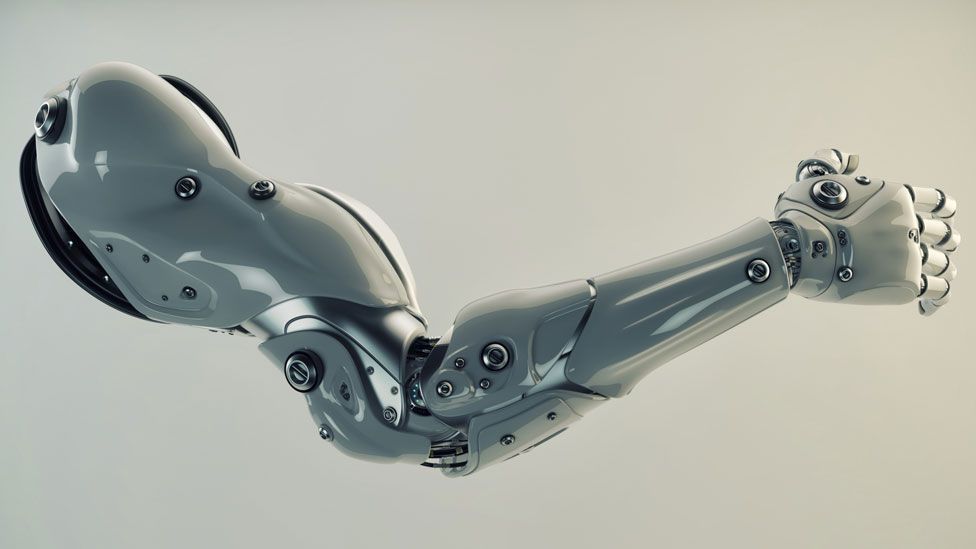
Could wearing robot prosthetics influence our future evolution? (Thinkstock)
Cultural influence on our own development continues quickly, but it is currently nearly incommunicable to predict just how it will happen. What sorts of genetic adaptations volition we run into as a result of our technological civilization? Will those adaptations apply universally, or only amidst some of united states of america? How volition human-machine interfaces, such as robotic prostheses or neural implants, affect our factor pools? Will the propensity for violent sports in some cultures lead to adaptations to protect against head trauma? And what are the questions we don't even still realise we should be request?
Information technology no longer makes sense to think of genetics and civilisation as two divide uninteracting monoliths. The difficulty is identifying how and if one is influencing the other. "This is the neat claiming for the field of cistron-culture co-evolution, and information technology is a formidable challenge," Laland writes. "Nonetheless, the best-researched examples, such as the lactose-tolerance case, not but testify that cistron-culture co-development occurs but also illustrate the ways to establish this."
If you would like to comment on this, or anything else you have seen on Future, head over to our Facebook or Google+ page, or message u.s. on Twitter .
Source: https://www.bbc.com/future/article/20140410-can-we-drive-our-own-evolution
0 Response to "as humans came to rely more on cultural adaptations what were the effects on our biology"
Post a Comment